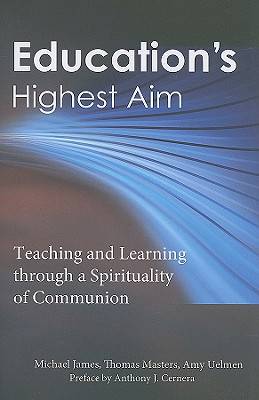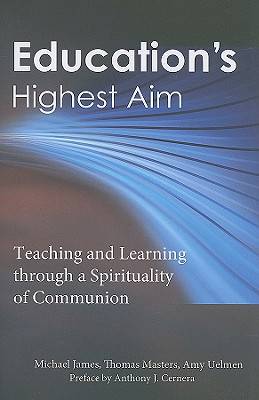
Bedankt voor het vertrouwen het afgelopen jaar! Om jou te bedanken bieden we GRATIS verzending (in België) aan op alles gedurende de hele maand januari.
- Afhalen na 1 uur in een winkel met voorraad
- In januari gratis thuislevering in België
- Ruim aanbod met 7 miljoen producten
Bedankt voor het vertrouwen het afgelopen jaar! Om jou te bedanken bieden we GRATIS verzending (in België) aan op alles gedurende de hele maand januari.
- Afhalen na 1 uur in een winkel met voorraad
- In januari gratis thuislevering in België
- Ruim aanbod met 7 miljoen producten
Zoeken
Education's Highest Aim
Teaching and Learning Through a Spirituality of Communion
Thomas Masters, Amy Uelmen, Michael James
Paperback | Engels
€ 20,95
+ 41 punten
Omschrijving
Education's Highest Aim will be valuable for anyone interested in understanding and improving education -- teachers'; groups; school administrators; university courses in curriculum, instruction, or educational foundations; parents' organizations; developers of public policy. "Here is an educational philosophy, a pedagogy and a practice grounded in the vision of unity, in a spirituality of communion. It is one that invites students, faculty, staff, administrators and families to work cooperatively for the development of the whole person. This is an educational aim of the highest order worth working together to achieve." Anthony J. Cernera, Ph.D.
President of the International Federation of Catholic Universities "... At the heart of the authors' application ... is the principle that the modern tensions of educational practice, including fragmentation, isolation, and secularism, can be reimagined through a 'spirituality of communion' among 'administrators, students, teachers, counselors, coaches, and maintenance staff.' The authors contend that Lubich's description of 'existential identity, ' where one 'achieves unity with another through a process of emptying oneself to be fully present with the other, ' can provide the harmony that is missing from a society in which individual competence is the norm.
Many of the stories and discussions could be ideal for an approach to the classroom and faculty meetings, and to learning how to walk alongside one another wherever conflict arises. In both complexity and simplicity, the book is a pleasant reminder of Jesus's summary of the law by first loving God and then loving one another. Christian administrators, teachers, and parents will find this book of particular interest." Karen Buchanan and Ken McChesney
from their review in Journal of Education and Christian Belief; Vol. 16, no. 1 (Spring 2012)
President of the International Federation of Catholic Universities "... At the heart of the authors' application ... is the principle that the modern tensions of educational practice, including fragmentation, isolation, and secularism, can be reimagined through a 'spirituality of communion' among 'administrators, students, teachers, counselors, coaches, and maintenance staff.' The authors contend that Lubich's description of 'existential identity, ' where one 'achieves unity with another through a process of emptying oneself to be fully present with the other, ' can provide the harmony that is missing from a society in which individual competence is the norm.
Many of the stories and discussions could be ideal for an approach to the classroom and faculty meetings, and to learning how to walk alongside one another wherever conflict arises. In both complexity and simplicity, the book is a pleasant reminder of Jesus's summary of the law by first loving God and then loving one another. Christian administrators, teachers, and parents will find this book of particular interest." Karen Buchanan and Ken McChesney
from their review in Journal of Education and Christian Belief; Vol. 16, no. 1 (Spring 2012)
Specificaties
Betrokkenen
- Auteur(s):
- Uitgeverij:
Inhoud
- Aantal bladzijden:
- 148
- Taal:
- Engels
Eigenschappen
- Productcode (EAN):
- 9781565483361
- Verschijningsdatum:
- 1/03/2010
- Uitvoering:
- Paperback
- Formaat:
- Trade paperback (VS)
- Afmetingen:
- 137 mm x 211 mm
- Gewicht:
- 204 g

Alleen bij Standaard Boekhandel
+ 41 punten op je klantenkaart van Standaard Boekhandel
Beoordelingen
We publiceren alleen reviews die voldoen aan de voorwaarden voor reviews. Bekijk onze voorwaarden voor reviews.









